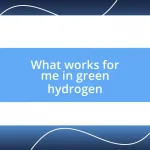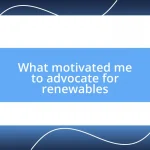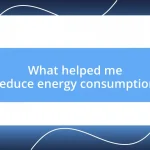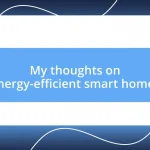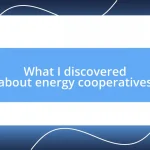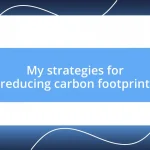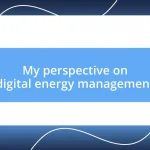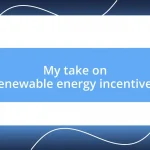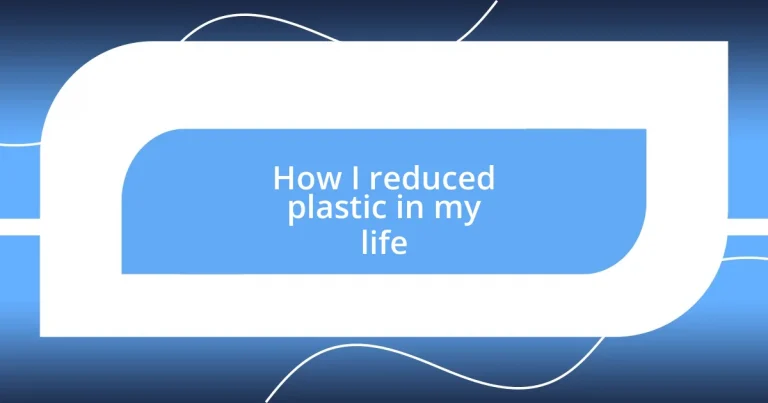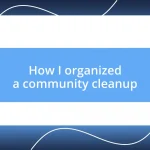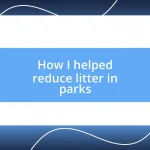Key takeaways:
- The impact of plastic pollution is profound, affecting marine life, ecosystems, and human health, prompting a need for awareness and change.
- Simple lifestyle swaps, such as using reusable bags, bamboo toothbrushes, and beeswax wraps, significantly reduce plastic waste and can be easily integrated into daily routines.
- Community involvement and shared experiences foster collective action towards sustainability, amplifying individual efforts and inspiring others to participate in reducing plastic use.
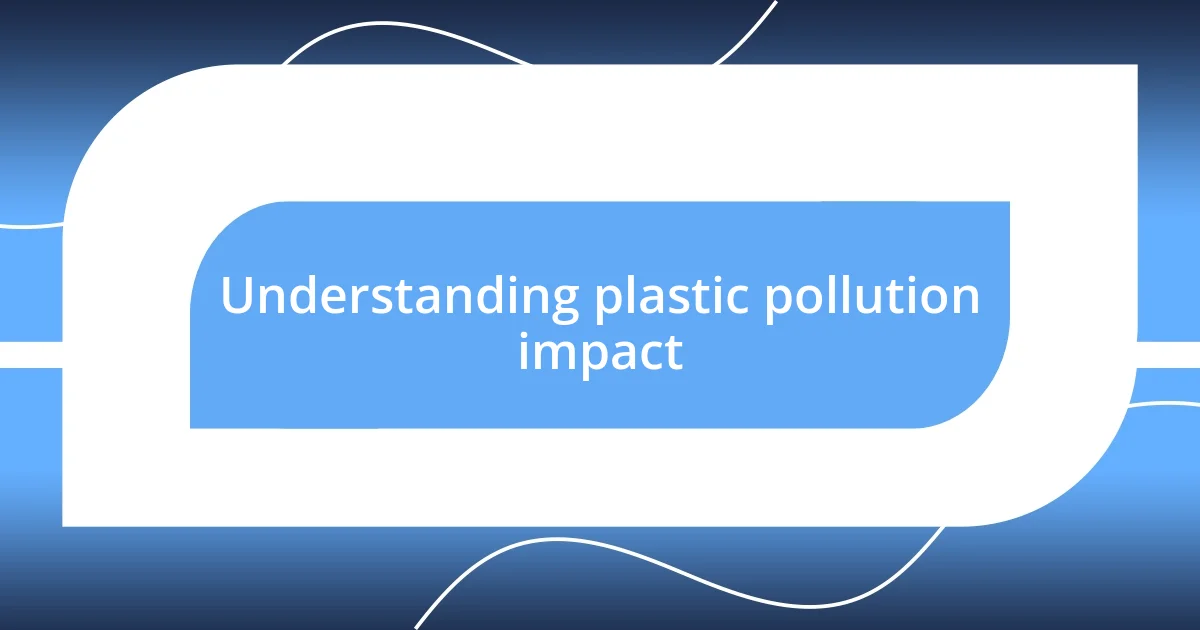
Understanding plastic pollution impact
Plastic pollution is an overwhelming issue that affects not just our oceans but also our health. I remember the moment I saw a documentary highlighting how marine life suffers because of plastic waste—seeing those majestic sea turtles mistaking plastic for food truly broke my heart. How can we justify the convenience of single-use plastics when they’re silently destroying ecosystems?
When I walk through local parks or along the beach, I often spot plastic littering the ground, a stark reminder of our collective habits. It’s disheartening to think that so many animals are ingesting these materials, leading to suffering and death—how many more lives must be harmed before we realize the true cost of our convenience? That visual connection made me rethink my own purchases and the impact they have.
Moreover, I began to understand the long-term effects of plastic pollution on our health. Studies show that microplastics can enter our food and water sources, raising concerns about potential toxicity. I can’t shake the thought of what might be creeping into my own body because of our reliance on plastic—shouldn’t we all be asking ourselves if our disposable lifestyle is worth the risks?
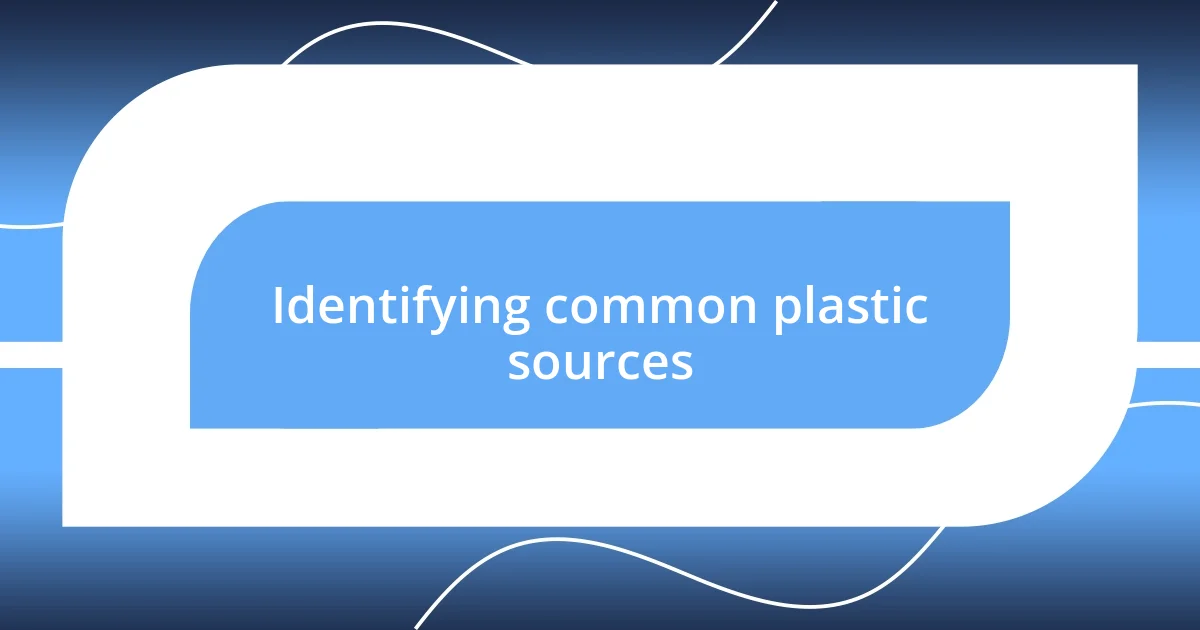
Identifying common plastic sources
Identifying common plastic sources has been an eye-opening journey for me. Initially, I was oblivious to how many everyday items contribute to plastic pollution. As I started to pay attention, it became clear that a variety of common products were at the root of the problem. For instance, I used to stockpile plastic bags from grocery trips without thinking twice. Now, I keep a foldable tote in my car as a simple reminder to always choose a reusable option.
Here’s a quick list of some common sources of plastic in our daily lives:
- Grocery bags: Single-use plastic bags are everywhere, often used just once.
- Water bottles: The convenience of bottled water leads to massive plastic waste.
- Food packaging: Many items come wrapped in layers of plastic that are hard to recycle.
- Toiletries: Items like shampoo bottles and toothpaste tubes contribute significantly.
- Straws and utensils: Disposable plastic straws and cutlery can be easily replaced with reusable options.
Reflecting on these, I realize that every small change in my habits can lead to a ripple effect in reducing overall plastic consumption. Each of these items is a chance to make more sustainable choices that contribute to the wellbeing of our planet.
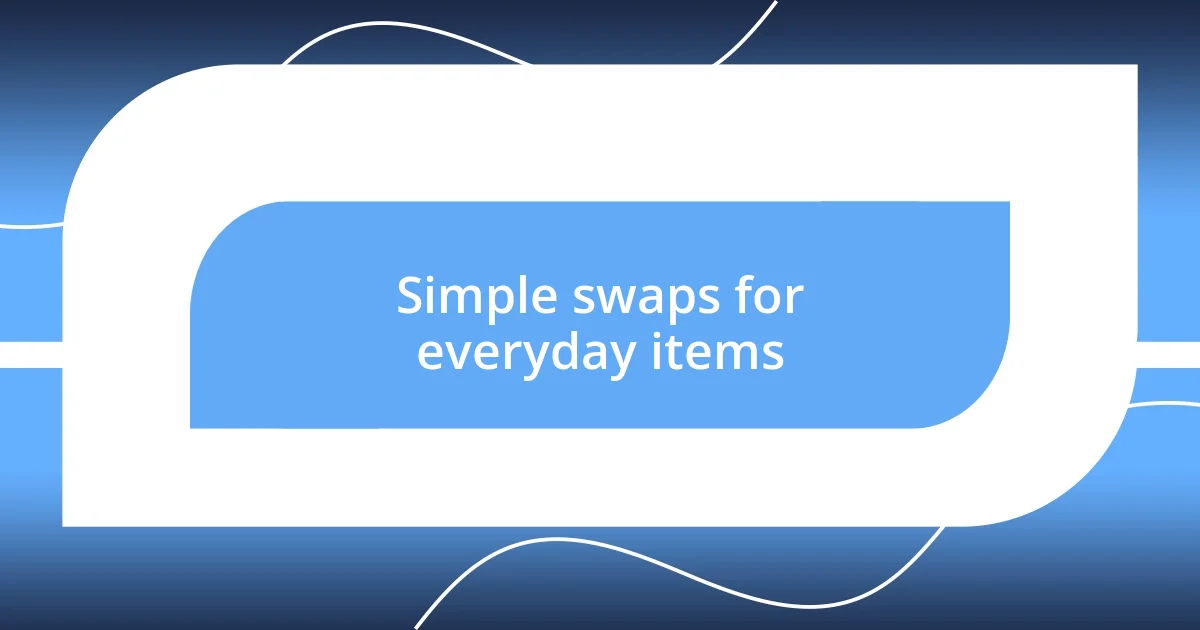
Simple swaps for everyday items
When I started to make simple swaps, I was surprised at how easy it was to reduce plastic in my daily life. For instance, I switched from plastic toothbrushes to bamboo ones. This change not only felt good for the environment, but the bamboo brushes even added a touch of elegance to my morning routine. It’s often the smallest items that leave the biggest impact.
Another swap that’s really made a difference for me is using reusable sandwich wraps instead of plastic wrap. I vividly remember the frustration of trying to untangle the sticky mess of plastic wrap, only to discover it perpetually rolls back on itself. Now, with my washable fabric wraps, I feel a sense of accomplishment every time I pack my lunch while knowing I’m making a sustainable choice. Plus, they come in such fun patterns!
I was amazed at how many items I could replace without sacrificing convenience. Swapping disposable razors for a safety razor felt daunting at first, but after using it for a few weeks, I never looked back. Not only do I feel more satisfied with the clean, smooth shave, but it’s comforting to know I’m cutting down on plastic waste every step of the way.
| Plastic Item | Simple Swap |
|---|---|
| Plastic bags | Reusable tote bags |
| Water bottles | Stainless steel or glass bottles |
| Plastic wrap | Reusable silicone lids or beeswax wraps |
| Plastic toothbrushes | Bamboo toothbrushes |
| Disposable razors | Safety razors |
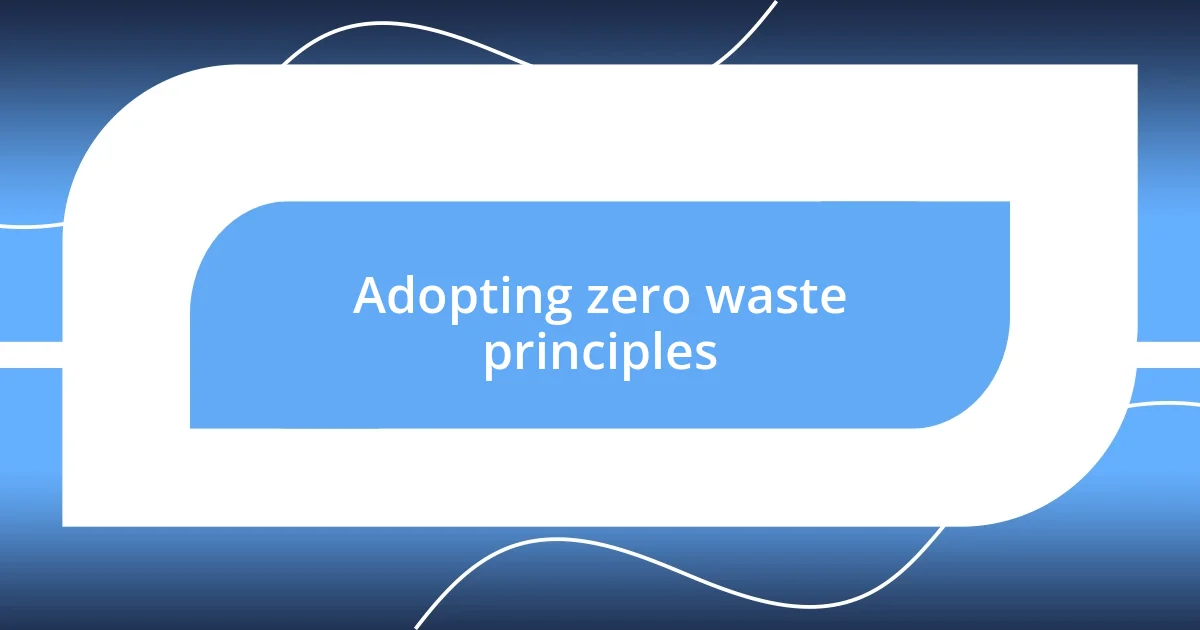
Adopting zero waste principles
Adopting zero waste principles isn’t just about eliminating plastic; it’s a mindset shift toward sustainability. One of my favorite practices involves using a bulk store for groceries. I remember the first time I walked in with my reusable jars and bags feeling a bit awkward but also empowered. Each time I filled my jars, I felt a growing sense of purpose, knowing I was actively reducing waste and supporting a more sustainable shopping method.
Additionally, I’ve started to reimagine how I approach daily activities. For instance, when I bake, I now use cloth instead of parchment paper, and I feel a wave of satisfaction every time I pull the delicious treats out of the oven. It’s astonishing how small decisions like these can fundamentally alter our relationship with waste and the environment. Have you ever considered how easy it is to take such simple actions, yet they culminate into a significant reduction in waste over time?
I also embraced the idea of repurposing items that would otherwise be discarded. An old glass jar that once held pasta sauce now serves as my bathroom storage for cotton swabs. This shift has sparked creativity in my home, making me realize how resourceful we can be. The beauty of zero waste living is discovering new uses for old items; it’s like a treasure hunt that rewards you with both sustainability and fulfillment.
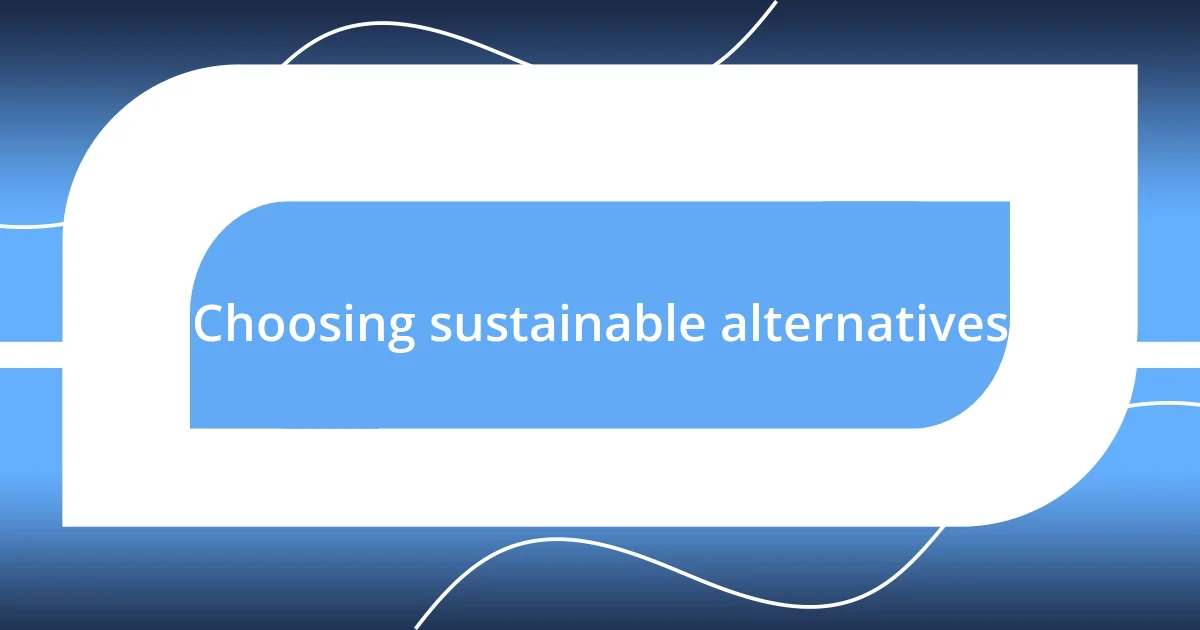
Choosing sustainable alternatives
When it comes to sustainable alternatives, I started with my shopping habits. I replaced traditional plastic bags with reusable tote bags. I still remember that sense of pride as I walked out of the store, knowing that I wasn’t contributing to the plastic pollution problem. It’s funny how a simple bag switch can turn every grocery run into a little victory for the environment.
Another change that made a big difference was switching single-use plastic water bottles for a stainless-steel one. Initially, I was skeptical about the convenience of carrying it around. But after a few days, I found myself enjoying the cold water through my insulated bottle. It became more than just a replacement; it evolved into a companion that reminded me of my commitment to sustainability. Have you ever felt like you’re carrying a piece of your values with you?
Lastly, I realized how much I could eliminate plastic in my kitchen by choosing beeswax wraps instead of plastic wrap. At first, I’d hesitate in the aisle, unsure about how well these wraps would perform, but I decided to give them a try. The first time I unwrapped leftovers to enjoy them days later, I was hooked. It felt good knowing that not only was I avoiding plastic, but I was embracing a product that actually performed better than the one I had used for years. It’s amazing how these choices can cascade into a more sustainable lifestyle!
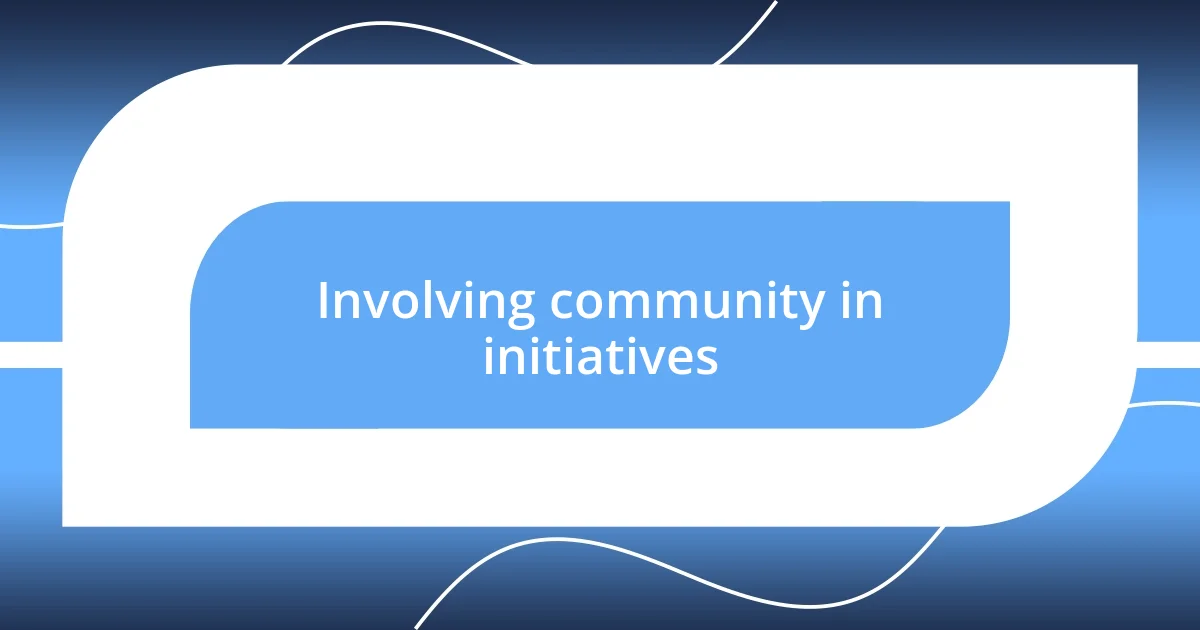
Involving community in initiatives
Getting the community involved in sustainability initiatives has been one of the most rewarding experiences for me. I organized a local cleanup day at the nearby beach, and honestly, witnessing friends and neighbors come together—armed with gloves and garbage bags—was uplifting. Have you ever felt that shared sense of purpose? It’s exhilarating to see how individuals can transform into a collective force, each picking up trash, and leaving behind a cleaner environment for everyone.
I also found that engaging local businesses can amplify our efforts. When I approached a nearby café about using compostable takeaway containers instead of plastic, the owner was thrilled to partner up. I felt a wave of excitement as we brainstormed ideas, and seeing their commitment inspired others in the area to make similar changes. Isn’t it fascinating how one conversation can motivate an entire community to rethink their purchasing choices?
Moreover, I’ve noticed that sharing my personal journey with plastic reduction sparked conversations with friends and family. I often host informal get-togethers where we swap eco-friendly tips, and it brings me joy when I see a friend excitedly share their newfound way of reducing waste. This exchange not only strengthens our bonds, but it also creates a ripple effect, inspiring others to take small yet impactful steps in their own lives. What if we all took a moment to share our experiences with those around us? The possibilities for change are endless!
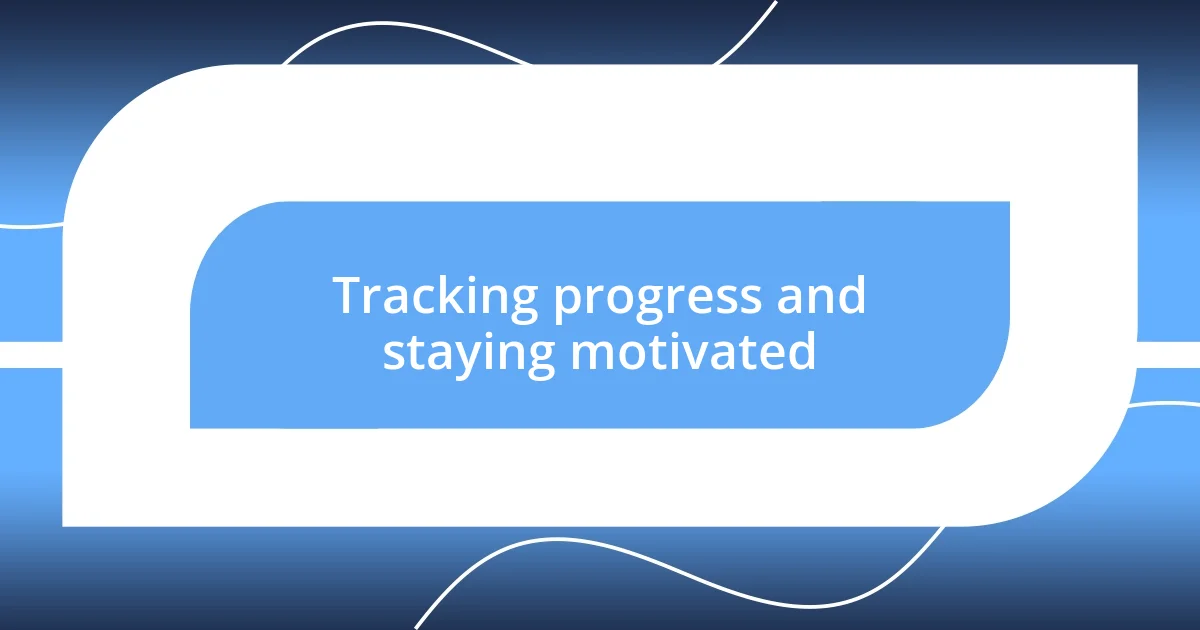
Tracking progress and staying motivated
Tracking my progress in reducing plastic was both fulfilling and enlightening. I started keeping a simple journal where I noted all the plastic items I avoided each week. This small act not only kept me accountable but also provided me with tangible evidence of my efforts. Have you ever written down your goals and felt that rush of motivation when you see them achieved? It’s like giving yourself a pat on the back!
Staying motivated throughout this journey sometimes felt challenging, especially when I hit roadblocks. I found that revisiting the reasons behind my commitment—like my desire for a cleaner planet for future generations—reignited my passion. On days when the convenience of plastic tempted me, a quick scroll through social media, following eco-conscious accounts and reading inspiring stories, served as a gentle reminder. How do you keep your own motivation alive during tough times?
Lastly, I began celebrating my milestones, no matter how small. Whether it was an entire week without single-use plastics or successfully convincing a friend to join me in my mission, I made a point to acknowledge these victories. I even treated myself to a little eco-friendly gift, bolstering my efforts further. Have you ever found joy in celebrating your progress? It’s moments like these that reinforce the journey, making it feel personal and significant.

